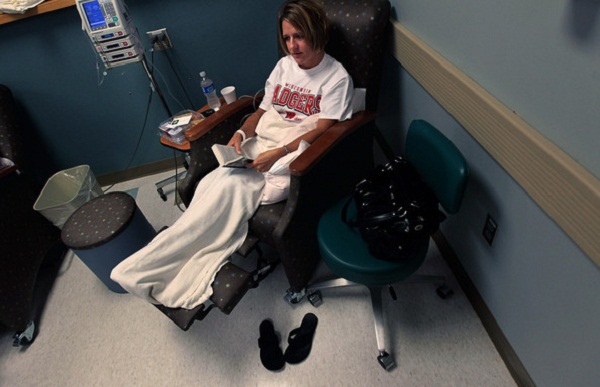Study: Cancer patients overestimate value of chemo

Cancer patient Kimberly Paulson sits with a book as she gets her chemotherapy treatment at the Cape Fear Valley Cancer Center August 4, 2010 in Fayetteville, North Carolina. Health care providers around the country are increasingly specializing their care by creating distinct treatment centers for various disorders and acquiring the latest high-tech medical equipment. AFP/Chris Hondros/Getty Images
NEW YORK — Most patients getting chemotherapy for incurable lung or colon cancers mistakenly believe that the treatment can cure them rather than just buy them some more time or ease their symptoms, a major study suggests. Researchers say doctors either are not being honest enough with patients or people are in denial that they have a terminal disease.
The study highlights the problem of overtreatment at the end of life — futile care that simply prolongs dying. It’s one reason that one quarter of all federal Medicare spending occurs in the last year of life.
For cancers that have spread beyond the lung or colon, chemo can add weeks or months and may ease a patient’s symptoms, but usually is not a cure. This doesn’t mean that patients shouldn’t have it, only that they should understand what it can and cannot do, cancer experts say.
Often, they do not. Dr. Jane C. Weeks at Dana-Farber Cancer Institute and researchers at several other Boston-area universities and hospitals led a study of nearly 1,200 such patients around the U.S. All had been diagnosed four months earlier with widely spread cancers and had received chemo.
Surveys revealed that 69 percent of those with lung cancer and 81 percent of those with colorectal cancer felt their treatment was likely to cure them. Education level and the patient’s role in care decisions made no difference in the likelihood of mistaken beliefs about chemo’s potential. Hispanics and blacks were three times more likely than whites to hold inaccurate beliefs.
Article continues after this advertisementFederal grants paid for most of the research.
Article continues after this advertisementIn an editorial that appears with the study in Thursday’s New England Journal of Medicine, two doctors question whether patients are being told clearly when their disease is incurable.
Patients also may have a different understanding of “cure” than completely ridding them of a disease — they may think it’s an end to pain or less disability, note Dr. Thomas J. Smith of Johns Hopkins University School of Medicine and Dr. Dan L. Longo, a deputy editor at the medical journal.
“If patients actually have unrealistic expectations of a cure from a therapy that is administered with palliative intent, we have a serious problem of miscommunication,” they write. “We have the tools to help patients make these difficult decisions. We just need the gumption and incentives to use them.”